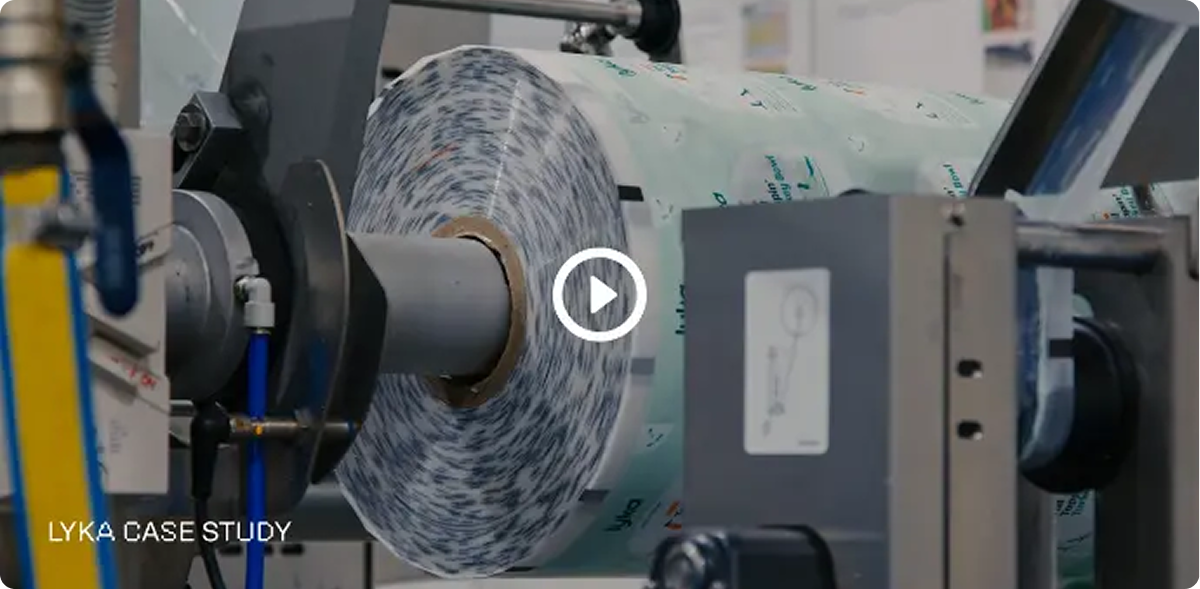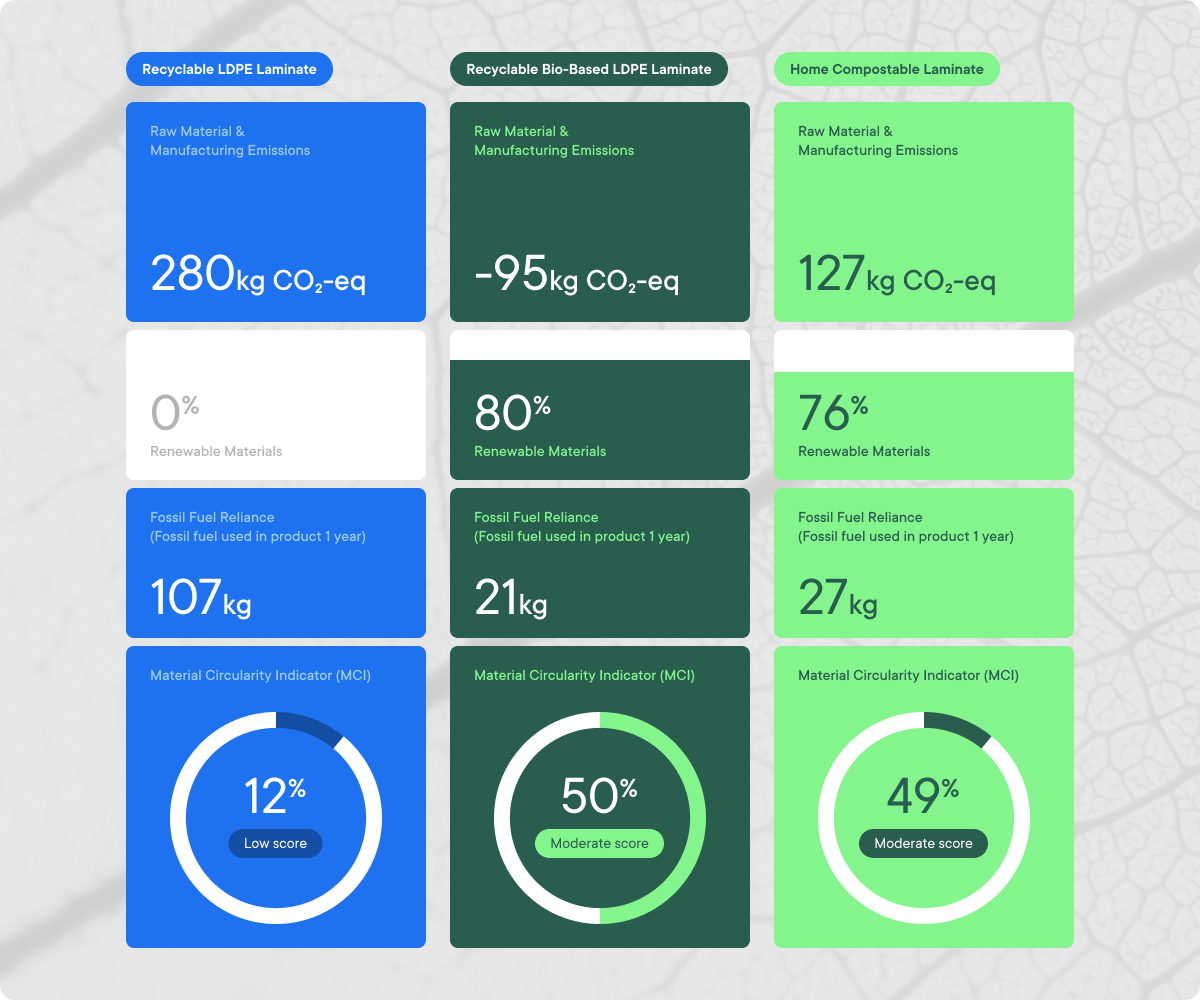Close Cookie Popup
Cookie Settings
By clicking “Accept”, you agree to the storing of cookies on your device to improve our services and your browsing experience.
As industries face increasing pressure to reduce their environmental impact, bioplastics have emerged as a scalable alternative to fossil fuel-based plastics. Among the most promising innovations is Sugarflex™, Grounded Packaging’s trademarked, plant-based material designed for flexible packaging.
Unlike conventional plastics, Sugarflex™ is made primarily from sugarcane and delivers a carbon-negative, recyclable alternative – helping businesses lower their footprint without compromising on performance or functionality.
Bioplastics, as defined by the European Bioplastics Organisation, are materials that are either biobased, biodegradable, or both. 'Biobased' refers to materials derived in part or whole from renewable biomass sources like corn starch, sugarcane, or wood pulp.
The core principle behind bioplastics is to reduce reliance on conventional petrochemicals by using plant-based inputs that can break down more naturally at end-of-life.
Learn more in our guide: Bioplastics vs. Oil-Based Plastics.
It’s easy to confuse bioplastics, biodegradable and compostable—but they’re not interchangeable.
Grounded’s Sugarflex™ is a biobased and recyclable material. Unlike compostables, it does not break down into soil, but it is designed to enter the LDPE #4 recycling stream, supporting a circular economy. A “biodegradable” plastic is one that might take decades or centuries to break down.
Compostable materials can be derived from either plant-based (such as cellulose, cassava root, and sugarcane) or fossil fuel sources. However, compostable materials are designed specifically to break down much more quickly and turn into organic matter. Certified compostable materials have stringent testing requirements to show that they break down under specific conditions and within a specific time frame.
More on this: Composting & Compostable Packaging.
Sugarflex™ is primarily derived from sugarcane ethanol, rather than petroleum. Its molecular structure is chemically identical to polyethylenehis means that while it behaves like conventional plastic in terms of performance and durability, its production process is significantly less carbon-intensive.

The biorefining process:
Sugarcane is a popular source because it absorbs carbon dioxide during growth, effectively offsetting some of the carbon emissions produced during the polymerization and manufacturing stages. In fact, some estimates suggest that sugarcane-based bioplastics can have up to 75% less carbon emissions than conventional polyethylene over its lifecycles.

1. Renewable & Carbon-Reducing
Sugarflex™ is derived from sugarcane, a rapidly renewable resource that helps reduce reliance on fossil fuels. As sugarcane grows, it naturally absorbs CO₂ from the atmosphere, making it a carbon-reducing material and significantly lowering its carbon footprint compared to conventional plastics.
2. Reduces Dependence on Fossil Fuels
By replacing petroleum-based plastics with plant-derived materials, it decreases demand for fossil fuels—a major contributor to greenhouse gas emissions and environmental degradation. With bio-based content, it provides a more sustainable alternative without compromising on performance.
3. Fully Recyclable within Existing Systems
Unlike many other bioplastics (like compostable materials), Sugarflex™ is fully recyclable within existing LDPE (low-density polyethylene) recycling streams. This allows it to be reintegrated into the circular economy, reducing the need for virgin plastic and minimizing landfill waste.
4. Food-Safe & Non-Toxic
Sugarflex™ is free from harmful chemicals such as phthalates, BPA, and endocrine disruptors commonly found in conventional plastics. This makes it an ideal choice for food packaging, ensuring both consumer safety and high performance in various applications.
Because it mirrors the strength and versatility of traditional plastics, Sugarflex™ is ideal for a wide range of flexible packaging applications. Its food-safe, moisture-resistant properties make it perfect for food packaging like stand-up pouches, snack wraps, vacuum-sealed bags, and lidding film. Beauty and personal care brands can also benefit from its recyclable structure for refill pouches and sachets.

The push for sustainable packaging solutions is stronger than ever, with consumers and regulatory bodies demanding eco-friendly alternatives. Sugarflex™ provides a viable solution that aligns with sustainability goals while maintaining the functionality required for flexible packaging.
By adopting materials like Sugarflex™, businesses can reduce their carbon footprint, support circular economy initiatives, and meet consumer demand for greener alternatives without compromising on quality.

Grounded offers our customers innovative, sustainable materials like Sugarflex™ that help brands transition to sustainable packaging at scale.
Our mission is to simplify sustainable packaging—making it accessible, transparent, and effective. By championing recycled and bio-based materials, we empower businesses to embrace a circular economy where packaging can be reused, recycled, or composted at end-of-life.
Reach out to our team to explore packaging solutions for your business or explore our Plantmade™ Materials.